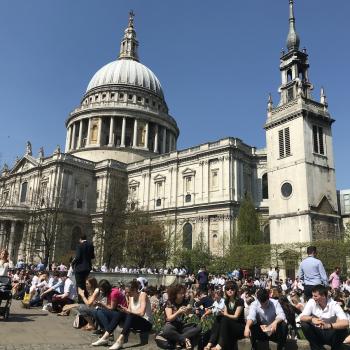Today we continue to hear from Phil Moore on 1 Corinthians:
SEEING GOD AMIDST THE MESS (1:1-9)
“I always thank God for you because of his grace given you in Christ Jesus.” (1 Corinthians 1:4)
Two of my relatives are former church leaders who have stepped out of ministry and turned their backs on the Church. If you heard their stories, you probably wouldn’t blame them. They saw church life at its worst and the disappointment crushed their spirits. Someone once said, “To dwell above with saints we love, well that will be such glory; but to dwell below with saints we know, now that’s a different story!” If you have ever found hurt instead of healing as part of a local church, then you will know that it takes more than a sense of humour to survive.
That’s why the first verses of 1 Corinthians are so surprising and so challenging. Paul doesn’t begin his letter with complaint or rebuke or disappointed finger-pointing. Instead, he tells the wayward Corinthians that “I always thank God for you.”
Hold on a minute. Always thank God for you?! Always thank God for the sinful bunch of rebels who had betrayed his trust in Corinth? Thank God for the church which was riddled with division, pride and puffed-up human wisdom? Thank God for Christians who were suing one another in the law-courts and shocking even their non-Christian neighbours with their acts of sexual perversion? Who were disorderly in worship, dishonouring the gifts of the Spirit, and drunk at the Lord’s Supper? Who were led astray by false teachers and had started doubting the reality of Jesus’ resurrection? How on earth can Paul begin his letter by telling the Corinthians that “I always thank God for you?” He explains in the second half of the verse: “because of his grace given you in Christ Jesus.”
I am not very good at Magic Eye pictures. Frankly, they look like a jumbled-up mess to me. My wife, on the other hand, can do strange things with her eyes and can always see a beautiful 3D picture hidden behind all the mess. Paul did the same when he looked at the sinful church at Corinth. Instead of feeling angry and giving up in disillusion, Paul saw God’s grace at work amidst the mess.
Paul wasn’t just a wishful thinker. He didn’t try to pretend that the Corinthians were doing better than they really were. “I face daily the pressure of my concern for all the churches,” he tells us in 2 Corinthians 11:28, and his intense concern is what makes these two letters so passionate. He looked sin full in the face within the messy church at Corinth, but then chose to focus his eyes upon God’s gracious 3D picture. He learned to dwell on God’s grace more than he did on human failure, and he let the truth of the Gospel save his heart from disappointment.
The Gospel reminded Paul of God’s work in the past, and this more than offset the bitter pill of the present. Every single one of those believers had once been dead in their sins and enemies of God, until God’s grace sought them out and raised them to life through his Spirit.1 They had not become church members because Paul convinced them it might help them to pray a sinner’s prayer, as Paul stresses by filling these opening nine verses with a series of passive verbs. They had been called by God’s initiative, sanctified through the shed blood of Jesus, and given grace in spite of their sin. They may look like a sorry bunch of washed-up, has-been Christians, but in truth they had been enriched through the Gospel. Paul had learned to focus on God at work amidst the mess, and he refused to write off anyone whom the Lord had written in.2
The Gospel also reminded Paul of God’s promises for the future. He must have felt punch-drunk when he listened to Chloe, Stephanas and a long line of other visitors with bad news from Corinth,3 but one great fact kept him buoyant through it all. “God, who has called you … is faithful,” he rejoices in verse 9, confident that this means “he will keep you strong to the end.” The same God who had called the Corinthians to follow him in the past would also keep them following him right until the end, because human unfaithfulness does not nullify God’s faithfulness.4 That’s what stopped Paul from giving up at the start of 55AD, from giving up in the spring when his emergency visit ended in heartbreak, and from giving up in the autumn when he wrote to them again. Ultimately, it was because Paul kept sight of God’s future grace for the Corinthians that he won them to repentance and helped them to see it too.
The Gospel also helped Paul to see God’s work in the present. Fault-finding is easy but grace-spotting requires faith. Paul needed it to see God’s fingerprints at Corinth, still at work amidst the mess. In spite of their sin, the Corinthians were still calling on the name of the Lord Jesus, and no one ever does that but for the working of God’s grace.5 Compared to their out-and-out paganism less than five years earlier, the changes to their speech and knowledge were living proof that the Gospel had saved them.6 Even the disorderly way in which they exercised the gifts of the Spirit bore testimony to the fact that God was present in their midst and had not given up on them. It is easy to focus on the negatives and disappointments, but those who understand the Gospel can see God at work in the midst of the mess.
Magic Eye pictures may not come naturally to you, but make sure that you see the 3D picture of God’s grace in the Church. If you don’t, you will find yourself complaining, church-hopping, and falling out of love with the Bride for whom Christ died. Your heart will eventually grow cold towards God’s People, and your joy in Christian ministry will begin to falter and die.
But if seeing God at work could give Paul strength to love, persevere and give thanks for the troublesome Corinthians in 55AD, then it is more than able to give us strength to cope with our own setbacks and disappointments today. I am amazed at how Paul won back the church at Corinth when they realised that he was more aware of God’s grace than he was of their failure. I am still amazed at the potential released in churches today whenever people learn to see God at work amidst the mess.












